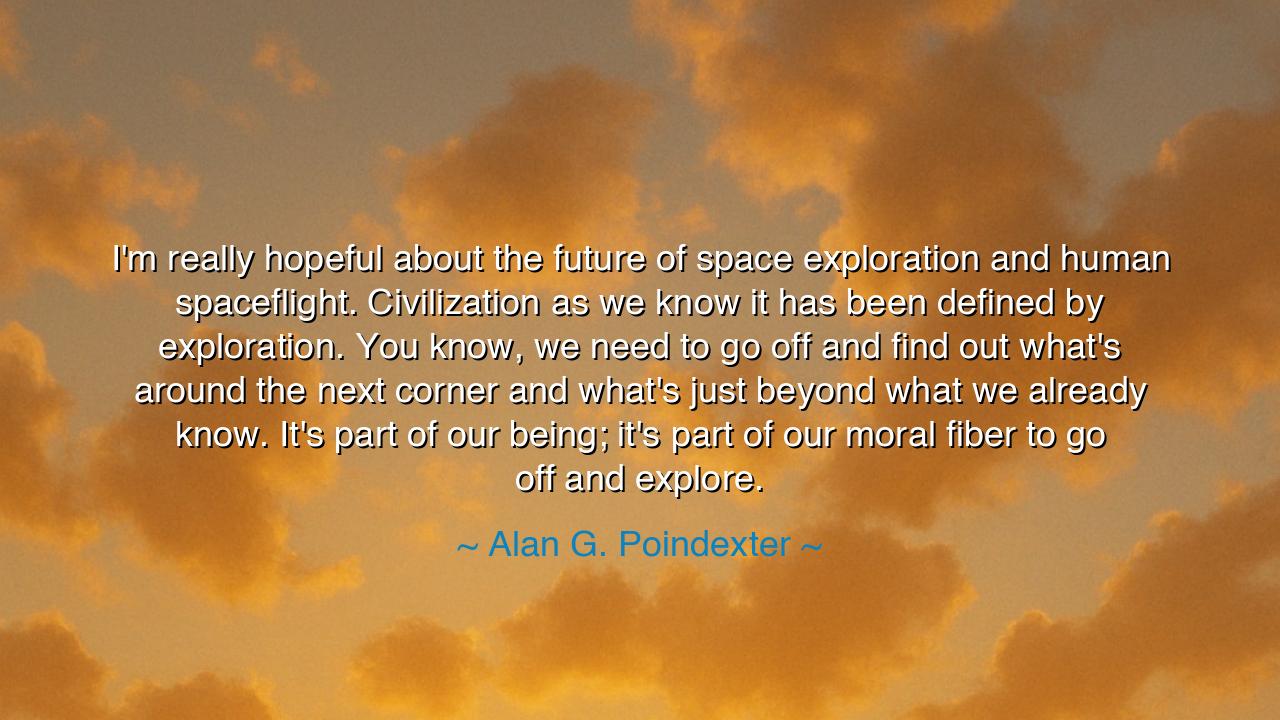
I'm really hopeful about the future of space exploration and
I'm really hopeful about the future of space exploration and human spaceflight. Civilization as we know it has been defined by exploration. You know, we need to go off and find out what's around the next corner and what's just beyond what we already know. It's part of our being; it's part of our moral fiber to go off and explore.






In the annals of human history, there has always been a compelling drive within us to look beyond the familiar, to seek out the unknown, and to expand the horizons of our understanding. Alan G. Poindexter captures this ancient urge when he says, "I'm really hopeful about the future of space exploration and human spaceflight. Civilization as we know it has been defined by exploration. You know, we need to go off and find out what's around the next corner and what's just beyond what we already know. It's part of our being; it's part of our moral fiber to go off and explore." These words echo a timeless truth: exploration is not merely an external act, but an intrinsic part of our nature, a defining feature of the human spirit.
The ancients were no strangers to this desire to explore. Homer’s Odysseus, the archetypal hero, spent his life journeying to distant lands, driven by an insatiable curiosity and a longing to discover what lay beyond the shores of the known world. The Greeks were pioneers in their own right, sending their explorers to the edges of the known world, across seas and into lands unknown, always seeking new wisdom, new lands, and new horizons. For them, exploration was not just a physical journey but a spiritual quest, a pursuit of truth and understanding. Poindexter’s reflection on space exploration is rooted in this very ancient longing—to venture forth and uncover the mysteries of the universe.
In ancient times, the concept of exploration was deeply entwined with the moral and spiritual fabric of a civilization. To explore was to seek enlightenment, to seek greater understanding of oneself and the world. The Romans, for example, valued the expansion of their empire as not just a matter of military conquest but as an extension of their cultural ideals—the spread of law, justice, and order. Hannibal, though a leader in opposition to Rome, undertook an extraordinary journey across the Alps with his army to show that there were no limits to where one’s will and vision could take them. The Romans, and indeed the Greeks before them, saw exploration as a moral duty—an essential part of what it meant to be human, to expand one’s world, and to learn from it.
Poindexter’s words reflect a similar view of exploration as a vital force for human progress. When he speaks of the future of space exploration and human spaceflight, he taps into the same sense of destiny that drove the ancient explorers. Just as the great mariners of antiquity set sail into the unknown, guided only by the stars and their ambition, so too must we venture into the great unknowns of space. In the grand narrative of human civilization, exploration has always been the driving force behind our greatest leaps—whether in science, philosophy, or technology. Space exploration, as Poindexter envisions, is the next frontier in this eternal journey, where our curiosity is not satisfied by the confines of Earth, but is pushed beyond the atmosphere to unveil the mysteries of the cosmos.
Yet, the moral fiber that Poindexter speaks of is equally important. In ancient societies, the greatest leaders were those who inspired their people to embark on bold, collective endeavors. Alexander the Great, in his quest for empire, sought not only military victory but also to push the boundaries of the known world. His ambition was not solely for personal gain, but for the greater good of his civilization. In his expeditions, Alexander encouraged his soldiers to look beyond the horizon, to push further than ever before, and to see themselves as part of something much larger than individual lives. Poindexter, too, believes that this exploration is not simply about advancement for its own sake, but about the betterment of humanity—a moral duty to reach beyond our limitations and secure a brighter future for all.
As we look toward the future, space exploration offers a hope that transcends individual ambitions. It represents humanity’s desire to overcome the bounds of our world and to embrace the infinite possibilities that lie beyond. In this pursuit, Poindexter’s words urge us to recognize the importance of exploration as an essential part of what it means to be human. It is a call to action, to not rest on our past achievements, but to set our sights on the future and continue the journey that our ancestors began. We must strive to explore not just for the sake of knowledge, but for the greater good—to ensure that future generations can build upon our discoveries and continue the quest for understanding.
The lesson we can take from Poindexter’s words is clear: exploration is not a mere curiosity—it is a calling, a part of the very essence of our being. In our own lives, we must not be content with the familiar, the known, but must reach beyond. Whether in our personal growth, our careers, or our communities, we are all called to explore. Let us seek to expand our knowledge, to embrace new ideas, and to push boundaries in all that we do. In doing so, we fulfill our moral obligation to future generations, ensuring that the light of curiosity, creativity, and discovery continues to burn brightly across time. Just as the ancient explorers journeyed into the unknown, so too must we venture into the limitless expanse of our future.






AAdministratorAdministrator
Welcome, honored guests. Please leave a comment, we will respond soon